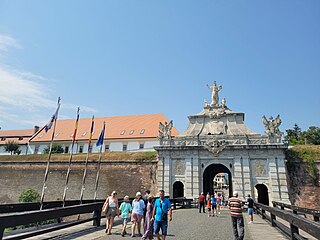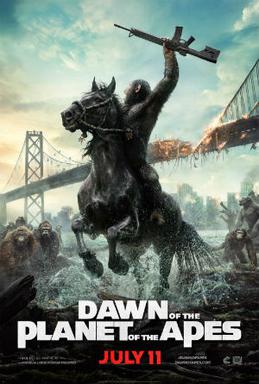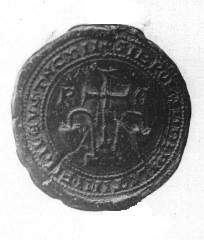
Johnny Weissmuller was an American Olympic swimmer, water polo player and actor. He was known for having one of the best competitive-swimming records of the 20th century. He set world records alongside winning five gold medals in the Olympics. He won the 100m freestyle and the 4 × 200 m relay team event in the 1924 Summer Olympics in Paris and the 1928 Summer Olympics in Amsterdam. Weissmuller also won gold in the 400m freestyle, as well as a bronze medal in the water polo competition in Paris.

Year 959 (CMLIX) was a common year starting on Saturday of the Julian calendar.

Alba Iulia is a city that serves as the seat of Alba County in the west-central part of Romania. Located on the river Mureș in the historical region of Transylvania, it has a population of 63,536.

Szentendre is a riverside town in Pest County, Hungary, between the capital city Budapest and Pilis-Visegrád Mountains. The town is known for its museums, galleries, and artists.

Baron Vilmos Apor de Altorja was a Hungarian Roman Catholic prelate, born as a baron in the noble Apor family, and served as a bishop during World War II. He became famous for protesting against the persecution of the Hungarian Jewish population and for his steadfast commitment to the poor. His outreach also extended to abuse victims with a particular emphasis on the protection of women - it would be this latter commitment that saw him sustain fatal injuries leading to his death. Apor dedicated himself to being an opponent of both communism and Nazism and used his sermons as a platform to condemn them though coming at a great personal risk to himself. Apor was a beloved figure in his diocese, where people hailed him as a great saint upon learning of his death.

The Hussite Bible is the oldest known Hungarian, as well as a general Uralic Bible translation, dated to the 1420s–1430s.

Baron Péter Apor de Altorja (1676–1752) was a Hungarian count (főispán) and historian. He was a member of the aristocratic Apor family.

The Kunmadaras pogrom was an anti-Semitic pogrom that took place shortly after the Second World War in Kunmadaras, Hungary. The pogrom took place on 22 May 1946. According to the Jewish Telegraphic Agency, three Jews were killed and up to 20 were injured.

Planet of the Apes is a science fiction media franchise consisting of films, books, television series, comics, and other media about a post-apocalyptic world in which humans and intelligent apes clash for control as the dominant species. The franchise started with French author Pierre Boulle's 1963 novel La Planète des singes, translated into English as Planet of the Apes or Monkey Planet. Its 1968 film adaptation, Planet of the Apes, was a critical and commercial hit, initiating a series of sequels, tie-ins, and derivative works. Arthur P. Jacobs produced the first five Apes films through APJAC Productions for distributor 20th Century Fox; following his death in 1973, Fox controlled the franchise, before its acquisition by Disney in 2019.

Rise of the Planet of the Apes is a 2011 American science fiction action film directed by Rupert Wyatt and written by the writing team of Rick Jaffa and Amanda Silver. It is a reboot of the Planet of the Apes film series and is the seventh installment overall and the first in the reboot series. The film stars James Franco, Freida Pinto, John Lithgow, Brian Cox, Tom Felton, and Andy Serkis. In the film, Caesar (Serkis), a chimpanzee genetically enhanced and raised by chemist Will Rodman (Franco), goes from living in captivity to eventually leading an ape uprising against humanity.

Rangwapithecus is an extinct genus of ape from the Early Miocene of Kenya. Late Miocene phalanges from Hungary have also been assigned to this genus, but were later reclassified as Dryopithecus.

Dawn of the Planet of the Apes is a 2014 American science fiction action film directed by Matt Reeves and written by Mark Bomback and the writing team of Rick Jaffa and Amanda Silver. The sequel to Rise of the Planet of the Apes (2011), it is the second installment in the Planet of the Apes reboot film series and the eighth film overall. It stars Andy Serkis as Caesar, alongside Jason Clarke, Gary Oldman, Keri Russell, Toby Kebbell, and Kodi Smit-McPhee. The film takes place 10 years after the events of Rise and follows a group of human survivors as they battle to stay alive in the wake of a deadly pandemic, while Caesar tries to maintain control over his expanding ape community which could lead to an all-out war between apes and humans.
Apor from the kindred Péc was a Hungarian baron and landowner at the turn of the 13th and 14th centuries, who held several secular positions during the reign of kings Ladislaus IV and Andrew III. He was one of the seven barons in the early 14th century, who were styled themselves Palatine of Hungary.

Anapithecus is a late Miocene primate known from fossil locations in Hungary and Austria. Many Anapithecus fossils come from the site of Rudabánya, in northern Hungary, where Anapithecus lived alongside the ape Rudapithecus. The only species in the genus, Anapithecus hernyaki, is named after Gabor Hernyák, chief geologist of the Iron Ore Works of Rudabánya.

War for the Planet of the Apes is a 2017 American science fiction action film directed by Matt Reeves, who co-wrote it with Mark Bomback. The sequel to Dawn of the Planet of the Apes (2014), it is the third installment in the Planet of the Apes reboot film series and the ninth film overall. It stars Andy Serkis as Caesar, alongside Woody Harrelson and Steve Zahn. The film takes place two years after the events of Dawn and follows the conflict between apes and humans as it has escalated into full war, while Caesar sets out to avenge those he has lost.
Rudapithecus is a chimpanzee-like genus of ape which inhabited Europe during the Late Miocene, approximately 10 million years ago. One species is known, Rudapithecus hungaricus. The genus name "Rudapithecus" comes from where it was discovered, in Rudabánya, Northern Hungary in 1965 and sent to Budapest in 1967. The specific name "hungaricus" refers to the country where it was discovered, in Hungary.

The Apor family is a family of ancient Hungarian nobility, which played a major role in Transylvanian history. It has several branches, which held different ranks over the years, including primor, and the Westernised titles of báró (baron) and gróf (count).

Bálványos Castle is a castle ruin of national monument status, located in the north of Covasna County, Romania. As a Romanian national monument, its code is CV-II-m-A-13297. "Bálványos" in Hungarian means "idolatrous", so the name of the fortress can be loosely translated into "the Castle with/of the Idols".
Péc or Pécz was the name of a gens in the Kingdom of Hungary. The powerful and illustrious Marcali and Apponyi noble families descended from this kindred. The clan had large-scale possessions in several counties of Transdanubia, in addition to Slavonia and other parts of the Kingdom of Hungary.

Roland (II) from the kindred Rátót was a Hungarian baron at the turn of the 13th and 14th centuries. He was one of the seven barons in the early 14th century, who were styled themselves Palatine of Hungary. He was the ancestor of the Jolsvai family.


















